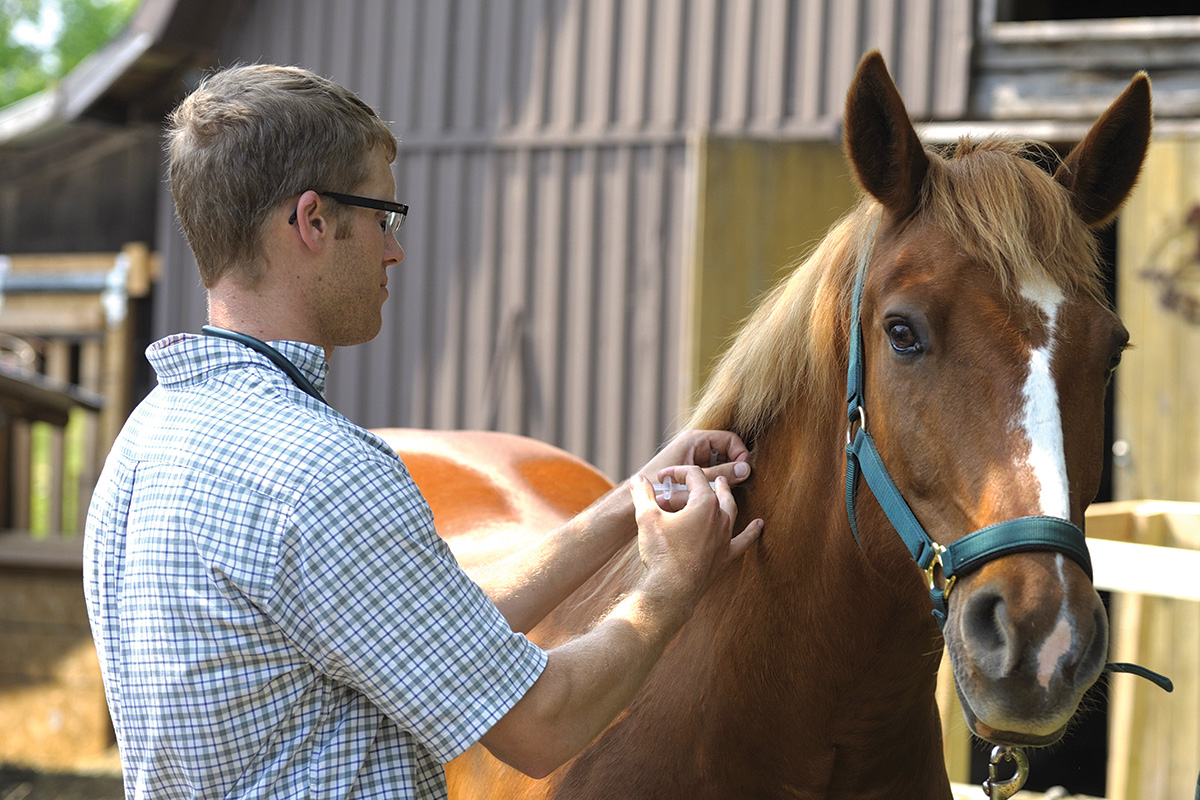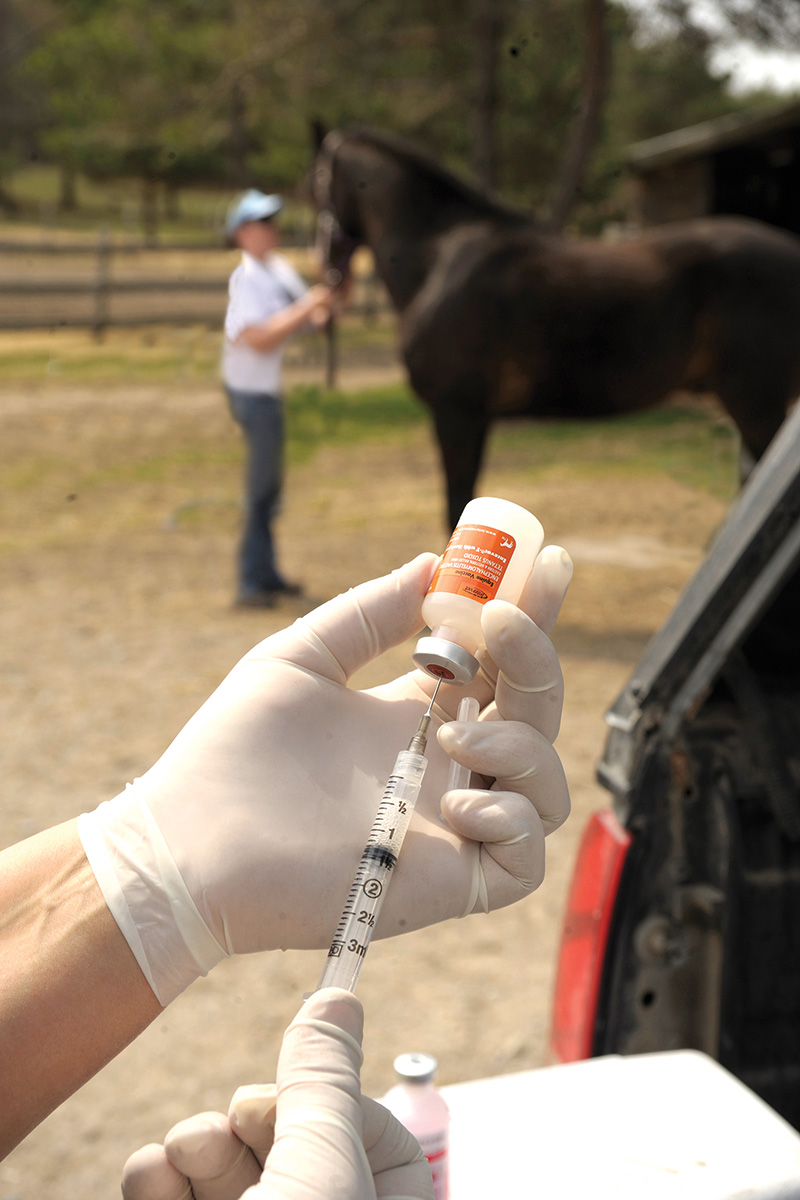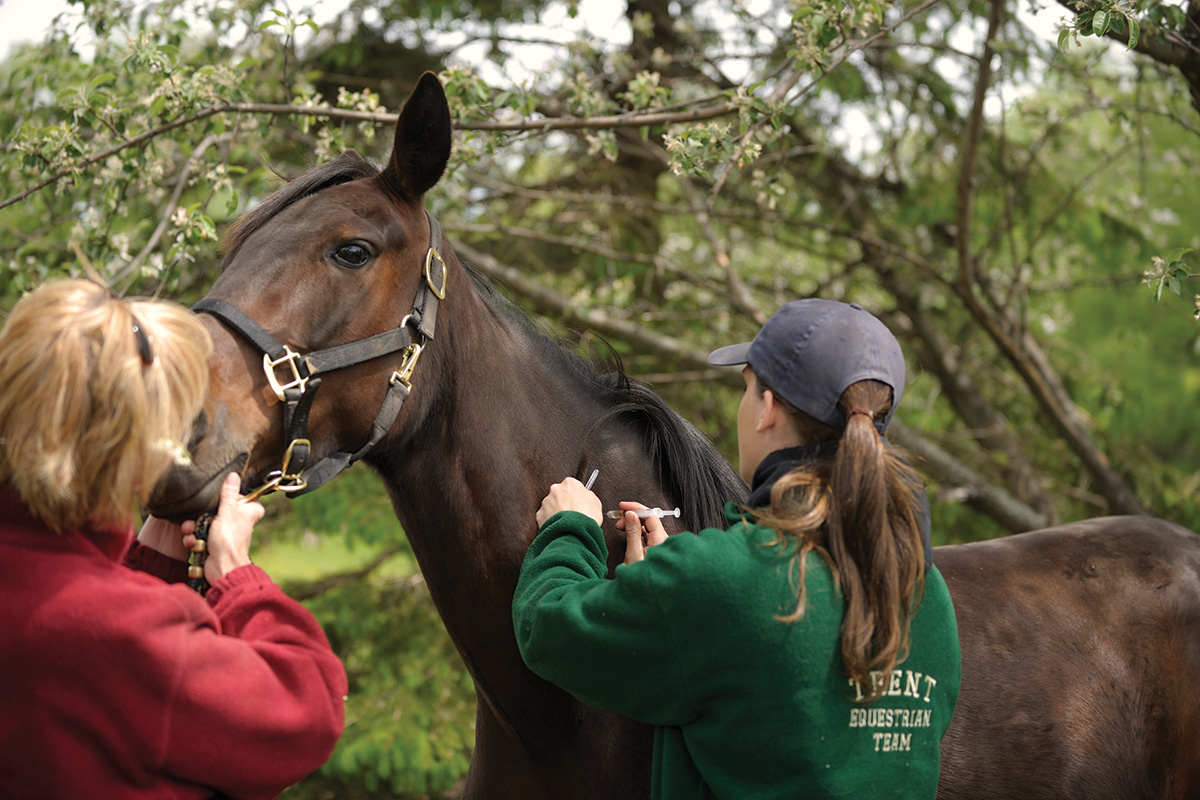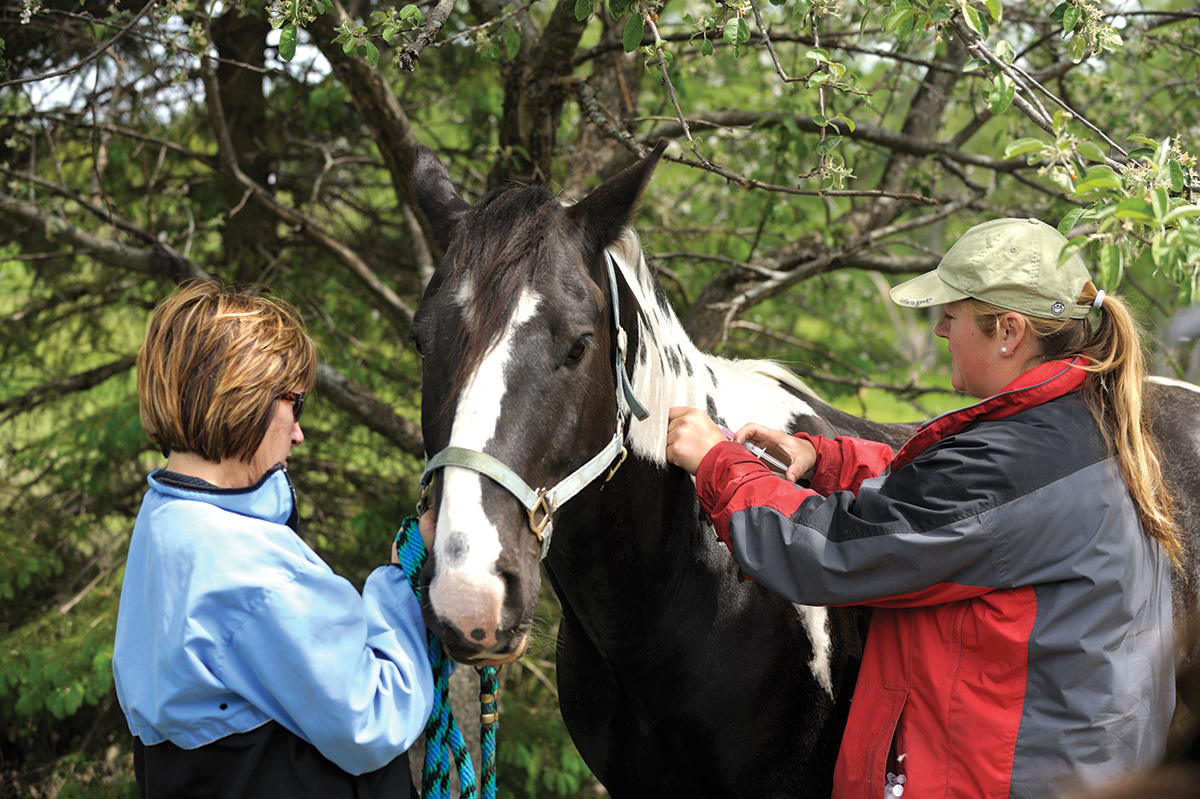Horse Vaccinations 101 - Horse Illustrated

Horse owners often find it challenging to keep up with the latest vaccination recommendations, and some may not grasp their importance in keeping horses healthy and strong. Your horse needs certain "core" vaccines, and may also need non-core vaccines based on his usual activities, geographic location, and other considerations.
Although you might be hesitant to get your horse poked, it's for his protection, and vaccines are generally safe. They have been well-tested, and many have been used for decades. Vaccination should be routine, so read on for current recommendations, potential side effects, and the overall importance of having your horse vaccinated.Core Vaccines
One of the best measures to protect your horse's health is a vaccination program. Core vaccines are often administered in an initial series of two to three shots, and then once or twice a year after that. Skipping core vaccinations could mean sickness or even death among your equine family.
The American Association of Equine Practitioners (AAEP) has established vaccination guidelines for horses. Core vaccinations are those recommended for all horses, regardless of age, sex or region where they live. These include any vaccines required by law and those that protect animals from diseases that are highly infectious, pose a risk of severe illness, are of potential public health significance, or are endemic to a region.
Kris Hiney, Ph.D., is an assistant professor and equine extension specialist for the Oklahoma State University Department of Animal and Food Sciences. She says the five core vaccines are Eastern and Western equine encephalomyelitis, West Nile virus, tetanus and rabies.
"We consider these 'core' due to the risk of fatality associated with these diseases," she says. "And the human health risk with rabies, of course."
5 Core Vaccines
The following are recommendations for core vaccines based on the guidelines provided by the American Association of Equine Practitioners. Always work with your veterinarian to develop the ideal vaccination schedule for your horse.
◆ Eastern & Western Equine Encephalomyelitis: EEE and WEE are primarily transmitted by mosquitoes, but they're also infrequently transmitted by ticks, other insects, or nasal secretions. While EEE has been reported throughout North and South America, WEE is more common in the western United States. Both have a high mortality rate, and vaccinations are recommended for all horses in North America.

◆ Rabies: Rabies is transmitted through the bite of an infected animal, typically wildlife, and is endemic in every state but Hawaii. Although the incidence of rabies in horses is low, it presents a considerable public health risk, and it's almost always fatal among horses, making it a core annual vaccination to all equines.
◆ Tetanus: Tetanus presents a risk to all horses and is often fatal. Although it isn't contagious, horses can develop tetanus through a Clostridium tetani infection resulting from its entrance into a wound or from environmental exposure to the toxin—which resides in the soil—if a horse eats contaminated soil or droppings. The vaccines currently available are recommended for all horses.
◆ West Nile Virus: WNV is nearly always transmitted by mosquitoes that have fed on infected birds. It's been identified throughout the continental United States, Mexico, and most of Canada, and is the leading cause of arbovirus encephalitis in horses. However, it's not directly contagious from horse to horse or equine to human.
Non-Core Vaccines
One or more non-core vaccines also may be recommended following a risk-benefit analysis. Recommendations of non-core vaccines vary based on region and specific horse populations
within an area.
The risks of horses contracting non-standard diseases aren't always easy to identify, which is one of the many reasons it's important to consult a veterinarian. Equine vets understand what's endemic in an area and which horses may be at higher risk for certain diseases, so they can recommend the appropriate non-core vaccines to add.
"Non-core—flu/rhino, strangles, Potomac—are considered risk-based more on the lifestyle of the horse and if they are endemic," Hiney explains.
Some non-core vaccinations that may be recommended due to risk-based assessments include:
◆ Anthrax
◆ Botulism
◆ Equine herpesvirus (also called equine rhinopneumonitis, or "rhino")
◆ Equine influenza (aka "flu")
◆ Equine viral arteritis
◆ Leptospirosis
◆ Potomac Horse Fever
◆ Rotavirus
◆ Snake bite
◆ Strangles
◆ Venezuelan equine encephalomyelitis
Don't Forget Boosters
Once your horse receives the initial series of a core vaccine, he'll still require boosters. Many vaccines require an annual booster to maintain immunity, but some diseases may require more frequent action.
"Booster frequency depends on how endemic the disease is and your horse's level of exposure," Hiney explains. She says there isn't a lot of research on how long vaccines last in horses, which is why they recommend annual boosters for all, and even more frequent ones in certain circumstances. She says they have a better idea of the duration of immunity in companion animals.
"To some degree, we're probably over-vaccinating horses for tetanus," says Garrett Metcalf, DVM, an equine veterinarian at Pine Ridge Equine Hospital in Glenpool, Okla. "However, horses are rather sensitive to the neurotoxin produced from Clostridium tetani that leads to the clinical signs of tetanus. Infected horses can be treated and saved, but up to 75 percent of them still die. It's better to just over-vaccinate them, which won't hurt them."
Boosters help maintain a good protective level of antibodies, so if you forgo boosters, your horse may no longer be protected when exposed to a disease. If you allow his annual vaccinations to lapse longer than a couple of years, your vet may recommend that the primary series be administered again before recommencing annual boosters.
Injection Site
The best injection site for vaccinations is another area where a veterinarian's extensive knowledge plays a key role. You must consider the possibility of adverse reactions when choosing injection sites.
For example, it's not recommended to inject vaccines into the gluteal muscles or hip region of a horse because considerable tissue damage can occur should an abscess develop. If lesions erupt, they could require a long healing time.
"The neck is the usual site, in the 'triangle,'" says Hiney. "But if a horse has an adverse reaction and his neck is stiff and sore, he may be more reluctant to move."

Metcalf says that some people still vaccinate their own horses, and some vaccines can be purchased at feed stores. He emphasizes that it's always better to let your vet administer vaccines, but if he has a client who insists on doing it themselves, he always shows them at least once where to give the shot.
"The ideal spot is [the triangle-shaped area] about the size of your hand right in front of the shoulder blade, in the middle of the neck," says Metcalf. "Too low and it's too near the cervical spine. Too high and it's in the fat within the nuchal ligament instead of the muscle.
"When it's in the fat, the horse won't have an immune response," he continues. "Horses can also get really sore when vaccinated in this spot. They can't lower their head to eat and can't move their neck well. Be educated."

While administering your horse's vaccines yourself isn't advisable, working with your vet also has the benefit of ensuring serious side effects can be quickly identified and handled properly. If you insist on administering vaccines yourself, realize that some manufacturers will not reimburse for adverse outcomes.
"The vaccine makers want a vet to administer vaccinations," Hiney says. "Usually, they only guarantee vaccines administered by a vet and not purchased online or through a feed store."
Adverse Reactions
Adverse reactions are an inherent risk of vaccination. Horses commonly experience local muscle swelling and soreness at the vaccination site. Transient, self-limiting clinical signs, which last only a short time and resolve without treatment, may include fever, lethargy, and lack of appetite.
Severe reactions at injection sites may require prolonged treatment and convalescence. Allergic-type reactions, such as hives, purpura hemorrhagica colic, or anaphylaxis can also occur and are particularly dangerous. Although unlikely to occur if proper procedure is followed, the potential for severe adverse reactions is one major reason why vaccines should be administered by a veterinarian.
"Some horses will react to the adjuvant, which is the 'extra' part that stimulates the horses' general immune system," Hiney says. "If that is the case, you may want to switch brands; it can make a difference."
Metcalf advises horse owners who are concerned about adverse reactions to research the vaccine manufacturer, because the reactions can vary. However, he says usually less than 1% of horses have a severe reaction.
Administering multiple vaccines of both multiple antigens and adjuvants simultaneously may increase a horse's risk of a reaction. When multiple products are needed, ask if your vet recommends staggering administration by three to four weeks between shots.
"If your horse has reactions, I would not give multiple [vaccines] at once," Hiney says. "But many manufacturers now bundle vaccines together, sort of a 'one and done.'"
If your horse has had a reaction in the past, you may need to avoid combo vaccines and stagger his shots.
"But then you have to worry about them developing a fever and other bad responses from having too many injections," warns Metcalf. "Most companies mix vaccines with five, six or seven types all together to keep injection sites from getting sore. There are actually fewer problems with the mix of vaccines, which we use."
Best Vaccination Practices
It's important to develop a comprehensive vaccination program, but a one-size-fits-all version for all horses doesn't exist.
"Talk to your vet," Hiney stresses. "Remember biosecurity! Even if you take a vaccinated horse to a show and have others at home, you may be dragging pathogens back with you, so always think about good biosecurity protocols—don't just rely on vaccines alone."
This article about horse vaccinations appeared in the March 2022 issue of Horse Illustrated magazine. Click here to subscribe!
Comments
Post a Comment